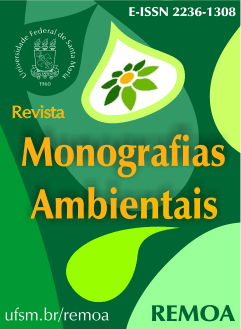Preservation of environmental resources of water and soil: promoting an environmental sensitivity at João Paulo II School, Bananeiras – PB
DOI:
https://doi.org/10.5902/2236130810908Keywords:
Education, Space schooled, EnvironmentAbstract
Considering the lack of sensitivity of most people across the soil and water, formal education is even more necessary, in order to promote a change of values and attitudes. Therefore aimed to assist learners experiencing the experiences that enable awareness and discursion on the amounts of environmental water and soil resources for the maintenance of life in the ecosystem, seeking alternatives that save money and conserve these resources, reducing environmental pollution. The work was developed through the project Caravan system air-water-soil and plants by public schools polo Borborema with the aid of Experimentoteca. Being developed through practical classes accompanied by exercises at the end of each lesson to check the assimilation of content. The study was conducted with 74 students, aged between 11 and 20 years and gender of 60% female and 40% male. When asked about the environmental problems, the same in sweating responses demonstrated knowing something about the themes discussed in class. With this work we explain the importance of the conservation of soil and water from methodologies that integrate theory with practice, using sustainable alternatives for the school is able to develop from recyclable materials, new way of teaching, developing students in reflexive awareness about environmental issues.Downloads
References
BALSAN, R. impactos decorrentes da modernização da Agricultura brasileira. CAMPO-TERRiTÓRiO: Revista de geografia Agrária, v. 1, n. 2, p. 123-151, 2006.
BRASiL. Lei Nº 9394 de 20 de dezembro de 1996. Estabelece as Diretrizes e Bases da Educação Nacional. Disponível em: http://www.planalto.gov.br/ccivil_03/leis/L9394.htm. Acesso em: 10 out. 2013, 19:25:10.
CAVALCANTE, A.C.P.; SiLVA, A.G.; OLiVEiRA, D.S.; DiNiZ, B.L.M.T. Água um recurso ambiental a ser conservado: visão dos educando do ensino fundamental de Roma, Bananeiras-PB. in: 65º Reunião anual da sociedade brasileira para o progresso da
ciência, 2013, Recife. Anais.
LELiS, J. L. LOBO, L. M. MUGGLER, C. C. CAON, K. G. CAMPOS, J. L. A. PEREiRA, D. M. ViLLAR, J. P. MORAiS, E. H. M. PRiMO, F. Discutindo o solo na escola: construção de conceitos e valores ambientais. Revista Brasileira de Agroecologia. v. 2, n. 2, p. 559-562, 2007.
MOREiRA, S. R.; PEREiRA, J. B. M.; MESSEDER, J. C. Educação ambiental x senso comum: o desafio de contextualizar a escassez dos recursos hídricos no planeta. Revista Ciência em Tela. v. 2, n. 1, p. 1-12, 2009.
MOTA, A. R. P.; CARDOSO, M. E. S.; SANTOS, D. H. Erosão e conservação dos solos na microbacia do córrego do veado. Revista Colloquium Agrariae. v. 4, n.2, p. 09-17, 2008.
MUGGLER, C. C.; ALMEIDA, S.; MOL, M. J. L.; FRANCO, P. R. C.; MONTEIRO, D. E. J. Solos e Educação Ambiental: Experiência com alunos do Ensino Fundamental na Zona Rural de Viçosa, MG. In: Congresso Brasileiro de Extensão Universitária, 2004, Belo Horizonte. Anais.
OLIMPIO, J.A.; a agricultura comercial e suas consequências sobre o ambiente nos municípios de palmeira do PIAUÍ e currais. 2004 148f. Dissertação (Mestrado em Desenvolvimento e Meio Ambiente) Universidade Federal do Piauí, Teresina, 2004.
OLIVEIRA, A. H.; SILVA, M. L. N.; AVANZI, J. C.; SILVA, M. A. da.; CURI, N. O processo erosivo é caracterizado pelo desprendimento e transporte de partículas de solo pelo vento ou pela água. Revista de Geografia. v. 27, n. 2, 2010.
SILVA, A.G.; CAVALCANTE, A.C.P.; SILVA, M.J.R.; Solo: visão dos educandos da zona rural de Bananeiras-PB in: II encontro de ecologia da Paraíba, 2013, Rio tinto- PB.
TUSSI, D. E. K.; NISHIJIMA, T. Educação ambiental no ensino público formal e a sensibilização para o valor e importância da água. Revista Monografias Ambientais. v.4, n.4, p. 758-772, 2011.
Downloads
Published
How to Cite
Issue
Section
License
Ethical guidelines for journal publication
The REMOA is committed to ensuring ethics in publication and quality of articles.
Conformance to standards of ethical behavior is therefore expected of all parties involved: Authors, Editors, Reviewers, and the Publisher.
In particular,
Authors: Authors should present an objective discussion of the significance of research work as well as sufficient detail and references to permit others to replicate the experiments. Fraudulent or knowingly inaccurate statements constitute unethical behavior and are unacceptable. Review articles should also be objective, comprehensive, and accurate accounts of the state of the art. The authors should ensure that their work is entirely original works, and if the work and/or words of others have been used, this has been appropriately acknowledged. Plagiarism in all its forms constitutes unethical publishing behavior and is unacceptable. Submitting the same manuscript to more than one journal concurrently constitutes unethical publishing behavior and is unacceptable. Authors should not submit articles describing essentially the same research to more than one journal. The corresponding author should ensure that there is a full consensus of all co-authors in approving the final version of the paper and its submission for publication.
Editors: Editors should evaluate manuscripts exclusively on the basis of their academic merit. An editor must not use unpublished information in the editor's own research without the express written consent of the author. Editors should take reasonable responsive measures when ethical complaints have been presented concerning a submitted manuscript or published paper.
Reviewers: Any manuscripts received for review must be treated as confidential documents. Privileged information or ideas obtained through peer review must be kept confidential and not used for personal advantage. Reviews should be conducted objectively, and observations should be formulated clearly with supporting arguments, so that authors can use them for improving the paper. Any selected referee who feels unqualified to review the research reported in a manuscript or knows that its prompt review will be impossible should notify the editor and excuse himself from the review process. Reviewers should not consider manuscripts in which they have conflicts of interest resulting from competitive, collaborative, or other relationships or connections with any of the authors, companies, or institutions connected to the papers.






